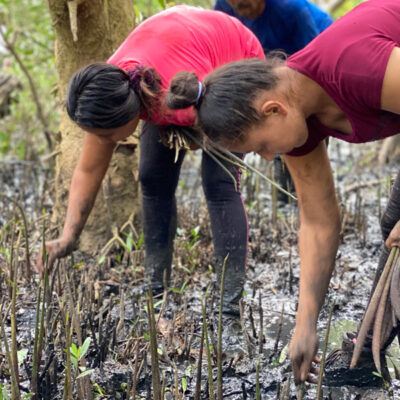Originally posted on the Pursue blog.
Until recently, I’d never really identified with the Organics movement, felt compelled towards the little green and white label or put much stock in my peers’ obsession with pesticide free-food. I chalked it up to feeling overwhelmed by the system and told myself that it was okay to focus on food access, supporting all people’s right to eat locally and healthfully, regardless of the agricultural methods used. I chose a CSA that sets aside a certain number of subsidized shares for low-income families. But until last week when I found Bigfoot’s-cousin-in-the-form-of-a-worm in my salad, I’d never thought twice about whether or not my leafy greens were USDA certified organic.
Tuesday night, at a screening organized by the Brooklyn Bridge CSA, a volunteer-led project of Pursue, the film What’s “Organic” about Organic? laid bare the scientific, social, and economic importance of the organic farming movement. Farmers and pundits told the story of the 1990 Organic Foods Production Act, the pioneering document that led to USDA standards and certification for organic foods. As these farmers spoke, it was clear to me that issues of food sovereignty are bound up with the way our food is grown, right down to the chemicals used.
It made me think about the real cost of food: organically produced foods generally cost the consumer more, but what is the long-term cost of the damage of conventional farming? Besides the clean-up of the eco-system needed after the spilling of toxic chemicals, there is harm to farm workers from those same chemicals and the widespread disruption of an ecological, sustainable system of supply and demand. Driving this home, the one conventional dairy farmer interviewed admitted that the consumer, the farmer, the animals and the earth would all be better if all farming was small-scale organic.
Most of the organic farmers featured in the film considered just labor practices an integral part of their operation’s organic character; some holding themselves to higher standards than even the USDA. The ideals of organic farming aren’t always evident in the federal or international standards: they don’t include comprehensive labor standards and the organic lettuce you purchase could still be shipped from South America, reversing the intended environmental benefits. The bottom line is that organic standards have evolved, but there is still much work ahead. Active food citizenship, not just consumption, will help the organic movement grow and continue to hold itself to high standards that take the entire food system into account.
Last night’s event helped me brainstorm with others how to take action in my local community – and as a food-citizen – to make this transformation possible. I’ll let you know how it goes!
Want to learn about action on the ground? The Agricultural Justice Project is one initiative working towards social justice standards for organic and sustainable agriculture. Check ‘em out.

